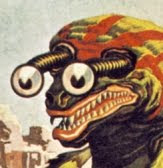"Oh, very often."
"And very true. Your lives are, therefore, as a rule, shorter; not so much by natural death as by indirect suicide."
Dialogue between Chang and Conway in Capra's film version of James Hilton's Lost Horizon.
Cheered by weird



 Set in New England but actually made in old England by an independent company, this 1960 movie provided an early non-Hammer horror vehicle for Christopher Lee and also a role for Valentine Dyall whose 'Man in Black' macabre storytelling series for BBC Radio had made him a star over here. In Britain the film went by the title City of the Dead. I've not seen a UK poster but this one from the USA is just great - way ahead of its time with the modern zombie-like portrayal of the undead (in the movie they're just vampires indistinguishable from living people) and for its joky strapline. The composition and the graphics are superb and I love the detail of the skeletal hand dangling the room key. You almost don't notice it's not in colour. The film is quite good in an unpretentious sort of way (bar some rotten dialogue) but not nearly as good as this striking poster would imply.
Set in New England but actually made in old England by an independent company, this 1960 movie provided an early non-Hammer horror vehicle for Christopher Lee and also a role for Valentine Dyall whose 'Man in Black' macabre storytelling series for BBC Radio had made him a star over here. In Britain the film went by the title City of the Dead. I've not seen a UK poster but this one from the USA is just great - way ahead of its time with the modern zombie-like portrayal of the undead (in the movie they're just vampires indistinguishable from living people) and for its joky strapline. The composition and the graphics are superb and I love the detail of the skeletal hand dangling the room key. You almost don't notice it's not in colour. The film is quite good in an unpretentious sort of way (bar some rotten dialogue) but not nearly as good as this striking poster would imply.




 Why were there so many weird painters from Belgium (cf James Ensor and Felicien Rops)? Is it because Belgium is so boring it sent them mad? Here are a few items by Antione Wiertz (1806-1865), whose stuff was considered so shocking that it was hidden away in a private gallery in Brussels from which sensitive maids and striplings were excluded. I believe the same gallery now constitutes the Musee Antione Wiertz.
Why were there so many weird painters from Belgium (cf James Ensor and Felicien Rops)? Is it because Belgium is so boring it sent them mad? Here are a few items by Antione Wiertz (1806-1865), whose stuff was considered so shocking that it was hidden away in a private gallery in Brussels from which sensitive maids and striplings were excluded. I believe the same gallery now constitutes the Musee Antione Wiertz. Yike! Imagine finding this crawling on your bin. Or in your bath! I thought it was time we had a real monster on Monstrous Monday. This is a Coconut Crab, which is found on many islands in the Pacific. It's also known as the Robber Crab because it allegedly has a habit of creeping into houses and stealing shiny things. Professor Wiki tells me that its Latin name is Birgus latro and that it is the biggest arthropod on Earth and probably about as big as any creature with a exoskeleton can get living on dry land. Those enormous pincers are used to crack coconuts, hence its name, but injuries to humans are very unusual (although in theory it can snap your arm off, or worse still mistake your sleeping head for a coconut).
Yike! Imagine finding this crawling on your bin. Or in your bath! I thought it was time we had a real monster on Monstrous Monday. This is a Coconut Crab, which is found on many islands in the Pacific. It's also known as the Robber Crab because it allegedly has a habit of creeping into houses and stealing shiny things. Professor Wiki tells me that its Latin name is Birgus latro and that it is the biggest arthropod on Earth and probably about as big as any creature with a exoskeleton can get living on dry land. Those enormous pincers are used to crack coconuts, hence its name, but injuries to humans are very unusual (although in theory it can snap your arm off, or worse still mistake your sleeping head for a coconut).




 I love this. It's like a kooky Doris Day movie gone wrong. I wonder at what point she discovered her new hubbie wasn't exactly human? On the honeymoon? Or during the reception when he started eating the other guests instead of the hors doeuvres? It dates from 1958.
I love this. It's like a kooky Doris Day movie gone wrong. I wonder at what point she discovered her new hubbie wasn't exactly human? On the honeymoon? Or during the reception when he started eating the other guests instead of the hors doeuvres? It dates from 1958.

 Before Austin Powers there was Simon Creem - Ostentatious Agent. Another creation of Jonathan Edwards, who kindly let me have a go at writing a script for him. I think our hope was for it to appear in Deadline magazine, but it suddenly stopped publishing. I'd forgotten all about it myself until I found it again when unearthing the (perhaps more successful) Dandies strip. The Mr Benn reference is obvious, of course, but the other shop's name was taken from a song by Vivian Stanshall, in which he refers to buying joss-sticks and a tie-dye poncho from 'Modern Poove of Carnaby Street'.
Before Austin Powers there was Simon Creem - Ostentatious Agent. Another creation of Jonathan Edwards, who kindly let me have a go at writing a script for him. I think our hope was for it to appear in Deadline magazine, but it suddenly stopped publishing. I'd forgotten all about it myself until I found it again when unearthing the (perhaps more successful) Dandies strip. The Mr Benn reference is obvious, of course, but the other shop's name was taken from a song by Vivian Stanshall, in which he refers to buying joss-sticks and a tie-dye poncho from 'Modern Poove of Carnaby Street'.


























